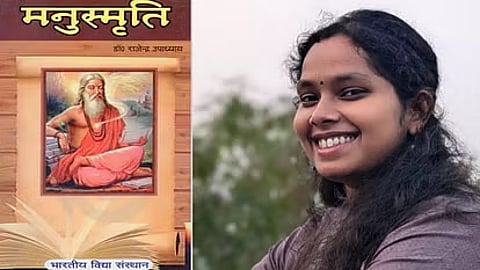
New Delhi- The Allahabad High Court dismissed a petition filed by Priyanka Bharti, a spokesperson for the Rashtriya Janta Dal (RJD) and a Ph.D. student at Jawaharlal Nehru University (JNU), seeking to quash an FIR registered against her for allegedly tearing pages of the holy book 'Manusmriti' during a live television debate. The court ruled that the act prima facie constituted a cognizable offense under Section 299 of the Bhartiya Nyaya Sanhita (BNS), 2023, which deals with deliberate and malicious acts intended to outrage religious feelings.
The incident occurred on December 29, 2024, during a live debate organized by news channels "India TV" and "TV9 Bharatvarsh." Priyanka Bharti, who was participating as an RJD spokesperson, allegedly tore a few pages of the 'Manusmriti,' a sacred text for a particular religious community. The act led to the filing of an FIR under Section 299 of the BNS at the Roravar Police Station in Aligarh. The FIR accused Bharti of intentionally insulting religious sentiments to gain publicity.
Bharti, in her petition, argued that she had no malicious intent and that her actions were not intended to outrage religious feelings. She claimed that she tore the pages to express her disagreement with certain aspects of the text and that the act was not premeditated.
Her counsel, Syed Abid Ali Naqvi, cited the Supreme Court's judgment in Mahendra Singh Dhoni vs. Yerraguntla Shyamsundar (2017) to argue that unintentional or careless acts do not attract charges under Section 295-A of the Indian Penal Code (IPC), which has been replaced by Section 299 of the BNS.
The bench comprising Justice Vivek Kumar Birla and Justice Anish Kumar Gupta, however, rejected these arguments. The court noted that the act of tearing pages of a religious text during a live televised debate, especially by a political spokesperson, prima facie indicated a deliberate and malicious intention to outrage religious feelings. The court emphasized that the petitioner, being a highly educated individual and a political representative, could not claim ignorance or lack of intent.
The court referred to Section 299 of the BNS, which states that any act done with the deliberate and malicious intention of outraging the religious feelings of any class of citizens is punishable. The bench also cited the Supreme Court's judgment in Ramji Lal Modi vs. State of U.P. (1957), which clarified that Section 295-A IPC (now Section 299 BNS) penalizes only those acts that are perpetrated with the deliberate and malicious intention of outraging religious feelings.
The court relied on several landmark judgments, including:
Mahendra Singh Dhoni vs. Yerraguntla Shyamsundar (2017): The Supreme Court held that unintentional or careless acts do not attract charges under Section 295-A IPC.
Ramji Lal Modi vs. State of U.P. (1957): The Constitution Bench upheld the constitutional validity of Section 295-A IPC, stating that it penalizes only aggravated forms of insult to religion.
Amish Devgan vs. Union of India (2021): The Supreme Court refused to quash FIRs involving allegations of hate speech, emphasizing that persons of influence, such as political leaders and media personalities, have a higher responsibility to ensure their actions do not incite hatred or violence.
The High Court concluded that the act of tearing pages of the 'Manusmriti' during a live debate was a visible and deliberate act that could not be dismissed as unintentional. The court noted that the petitioner, as a political spokesperson, had a duty to act responsibly, especially in a public forum. The bench observed that the act was done without any lawful excuse and prima facie constituted an offense under Section 299 of the BNS.
In light of the legal precedents and the facts of the case, the court dismissed the petition, refusing to quash the FIR. The court also declined to grant any relief regarding the petitioner's arrest, stating that the investigation should proceed as per law.
The case has sparked a broader debate on the limits of political expression and the role of the judiciary in addressing actions that potentially inflame religious tensions. As the investigation proceeds, the legal and political ramifications of this case are likely to be closely watched.
You can also join our WhatsApp group to get premium and selected news of The Mooknayak on WhatsApp. Click here to join the WhatsApp group.